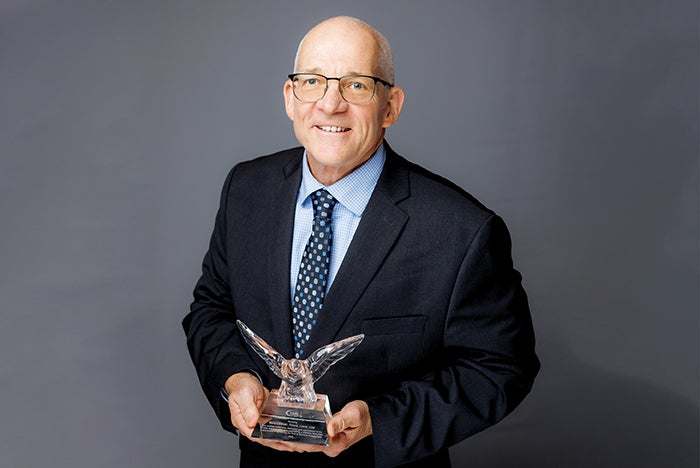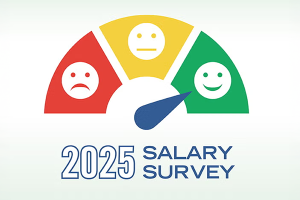Crystal Eagle winner centers on reliability

The David Lockhart File
CV
- National executive director of facilities operations at Kaiser Permanente in Oakland, Calif.
- Support services administrator at Kaiser Permanente in Roseville, Calif.
- Project manager and owner’s representative at Kaiser Permanente in Roseville.
Accomplishments
- American Society for Health Care Engineering (ASHE) Emerging Regional Leader Award winner.
- ASHE Reliability-Centered Maintenance Task Force chair.
- Former ASHE Advisory Board Region 9 Representative.
- ASHE “Reliability-Centered Maintenance Guide” author.
- California Society for Healthcare Engineering past president.
- California Society for Healthcare Engineering sustainability liaison.
Education
- Bachelor’s degree in vocational education at California State University in Sacramento.
- Associate degree in mechanical electrical technology at Sacramento (Calif.) City College.
- College certificate in industrial electricity from Chaffey College in Rancho Cucamonga, Calif.
David Lockhart, CHFM, CEM, CRL, FASHE, 2025 Crystal Eagle Award winner, discusses the role mentors have played in his career, commitment to excellence in facilities management and his dreams for the field.
Congratulations on being named the 2025 Crystal Eagle honoree. What did it feel like when you received the news?
Wow! Getting the call from American Society for Health Care Engineering (ASHE) President Mike Hatton that I was selected for the Crystal Eagle Award was a very emotional phone call. However, when I first heard that ASHE members Lindsey and Josh Brackett wanted to nominate me for this award, that too was very special. Lindsey and Josh are an incredible couple who are both doing amazing things for our field. When they shared that I had influenced and impacted their and many others’ careers, I was blown away. I love the work I do, and I love collaborating, but that is just what I do as my job. There are mentors I’ve had that I can almost guarantee would say the same thing: “I’m just doing my job.” To think that I was being nominated for this lifetime achievement award was incredibly humbling. But I do have a passion to make a difference in improving our field, and because I’ve had the privilege of mentoring under some amazing leaders, I want to carry on their desires to make a difference as well.
Who are those mentors who have helped you in your career?
Tom Schipper was a mentor of mine early on when I came to Kaiser Permanente. Tom wanted to make a difference in health care, and I really admired that. He also introduced me to reliability-centered maintenance (RCM) within health care. The other person who comes to mind is George Mills, who was a director at Joint Commission. He could have been a larger-than-life person, but he instead came to ASHE conferences and made himself available. He wanted you to be successful.
I also have gained so much from ASHE and my local ASHE Chapter, the California Society for Healthcare Engineering (CSHE). An associate of mine brought me as a guest to this association. At that first meeting, my eyes opened because I had found my community. There were veterans from organizations like UC Davis Medical Center and Sutter Health. The opportunities I received from CSHE and ASHE — the networking, friendships, knowledge and education, along with the presentation and writing opportunities — helped push me out of my comfort zone.
What impact did your Navy experience have on your career?
The Navy gave me discipline and career direction. I joined as a basic seaman, but after meeting some electricians on my ship, I worked to become an electrician’s mate. I got exposed to things like generators, critical infrastructure and RCM.
How has your work with RCM evolved over the years?
My mentor Tom Schipper was passionate about bringing RCM to health care. I also had the privilege of mentoring under Anthony “Mac” Smith, a pioneer in RCM. Through Mac, I was introduced to Terrence O’Hanlon with The Reliability Web and the Uptime Elements Framework.
Industries like aerospace have been perfecting RCM and asset management, which means we in health care can pick up these systems and customize them for our operations. We can really make a difference by better measuring and managing our systems.
Something Mac always talked about is that facilities departments should be considered a profit center. When we keep systems running and help increase asset life cycles, we help make our organizations profitable. We need to help our clinical leaders understand that. Our assets and equipment perfectly align with patient care. The database we use, I call it a medical record. When we install a new asset, it’s like a new baby. We give it a unique identification number, like a Social Security number. We enter the data just like you would for a patient. Is it healthy? Is everything functioning? As we track its life cycle, we can measure how we’re maintaining it to keep it healthy. When I talk about a compressor in that way, the nurse executive understands it.
What other evolutions do you hope to see in the field?
I look forward to the day when we have a measurement and recognition program that recognizes the best practices in asset management that extend the functional performance of our facilities. I had the privilege to work with ASHE to help create the Energy to Care® Program. Just as Energy to Care helps organizations measure their performance and awards those that are operating in a highly energy-efficient way, we should be recognizing the designs, products, operations and maintenance programs that are extending function and performance and avoiding system failures as a new, higher level of performance.
Are there philosophies that have helped shape your career?
It’s important to be a servant-leader and lift those around you. I grew up in a dysfunctional house, but my grandmother told me, “Dave, you’re a very special person, and God put you here to make a difference.” So, as I’ve moved up in leadership, I have at times questioned myself, “What is my purpose? What should I be doing?” Her words help me realize that I enjoy what I’m doing. I don’t need to change jobs; I just need to try to make a difference and make things better around me and for those I come across. In my Crystal Eagle Award acceptance speech, I mentioned a book that has stuck with me. How Full is Your Bucket? speaks to serving others one ladle at a time. As you’re serving others, you take a ladle out of your bucket and put it in someone else’s, but unbeknownst to you, your bucket just got fuller because serving comes with gratitude and growth.
We also should always be sharpening our saws. I came to Kaiser Permanente after installing a new emergency generator for one of its facilities, after which I accepted a job opening for an engineer. This career change prompted me to go back to school and earn my associate degree to learn more about hospital functions. When I wanted to move up in Kaiser, I went to night school part-time and earned a bachelor’s in vocational education, which helps me in presenting and educating others in our field.
What advice would you give to someone who wants to progress in their career?
Get involved with ASHE and your local ASHE Chapter. Find a mentor and a group you can grow with. There is a concept that talks about how we are the average of the five people we hang around with the most. With this understanding, I created the “Circle of Six.” It would be great to build and develop a bunch of circles in ASHE, where folks grab five people around them who know a subject matter better or who they can mentor.
You should also find things that are meaningful to you. It does not need to be grand; it just needs to be meaningful. But, above all those things, make sure to take care of yourself and your family.
What would your six-word memoir say?
I thank God for my life.
Jamie Morgan is senior editor at Health Facilities Management magazine.




